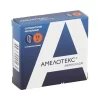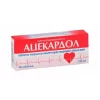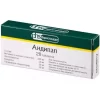Description
Diclofenac Retard Pharmacodynamics
The drug Diclofenac contains sodium diclofenac, a substance of non-steroidal structure, which has a pronounced analgesic, anti-inflammatory and antipyretic effect. The main mechanism of action of diclofenac, established in studies, is considered to be inhibition of the synthesis of rostaglandins, which play an important role in the pathogenesis of inflammation, pain and fever.
In vitro diclofenac sodium in concentrations equivalent to those achieved when used in humans does not inhibit cartilage proteoglycan biosynthesis.
In rheumatic diseases anti-inflammatory and analgesic properties of diclofenac provide clinical effect, characterized by a significant reduction of severity of such manifestations as pain at rest and during movement, morning stiffness and joint swelling, as well as improvement of functional status.
In post-traumatic and post-operative inflammatory phenomena diclofenac quickly relieves pain (both at rest and during movement), reduces inflammatory swelling and edema of postoperative wound.
This dosage form is especially suitable for patients who require a long-term dosage of 100 mg per day.
Indications
– Inflammatory and degenerative diseases of the musculoskeletal system, including:
-rheumatoid arthritis;
-ankylosing spondylitis and
other spondyloarthropathies;
-osteoarthritis;
– bursitis, tendovaginitis.
– Pain syndromes from the spine (lumbago, sciatica, ossalgia, neuralgia, myalgia, arthralgia, radiculitis).
– Algodysmenorrhea, inflammatory processes in the pelvis, including adnexitis.
– Post-traumatic and postoperative pain syndrome accompanied by inflammation, e.g. in dentistry and orthopedics.
The drug is intended for symptomatic therapy, reduction of pain and inflammation at the time of use, does not
effect.
Contraindications
– Hypersensitivity to diclofenac, auxiliary components and other nonsteroidal anti-inflammatory drugs.
– Complete or incomplete combination of bronchial asthma, recurrent nasal and paranasal sinus polyposis and intolerance to acetylsalicylic acid or other non-steroidal anti-inflammatory drugs (including history).
– Exacerbation of gastric and duodenal ulcer, gastrointestinal bleeding, perforation of the gastrointestinal organs.
– Conditions accompanied by the risk of bleeding.
– Inflammatory bowel diseases (ulcerative colitis, Crohn’s disease, proctitis) in the acute phase.
– Hemophilia and other blood clotting disorders.
– Active liver disease.
– Decompensated heart failure.
– Uncontrolled arterial hypertension.
– Chronic heart failure, NYHA functional class II-IV.
– Clinically confirmed coronary heart disease.
– Diseases of peripheral arteries and cerebral vessels.
– Severe liver dysfunction.
– Renal insufficiency (glomerular filtration rate (GFR) less than 15 ml/min/1.73 m2), advanced kidney disease.
– Early postoperative period after coronary artery bypass grafting.
– Confirmed hyperkalemia.
– Third trimester of pregnancy.
– Breast-feeding period.
– Childhood (under 18 years).
– Hereditary lactose intolerance, impaired glucose-galactose absorption, lactase deficiency.
Dosage and administration method
- The drug dose is adjusted individually, and in order to reduce the risk of side effects it is recommended to use the lowest effective dose, if possible, with the shortest possible treatment period, according to the purpose of treatment and the patient’s condition.
- Tablets should be swallowed whole, preferably with meals. The tablets should not be divided or chewed.
- Adults. Recommended initial dose is 100 mg (1 sustained-release tablet with enteric coating) per day. The same daily dose is used for moderately severe symptoms and for long-term therapy. In those
When symptoms are most pronounced at night or in the morning, sustained release tablets coated with enteric coated tablets should preferably be taken at night. The maximum daily dose of diclofenac (for all indications), taking into account other dosage forms should not exceed 150 mg. - Children and adolescents under 18 years of age.
The drug in this dosage should not be taken in children and adolescents under 18 years of age. - Elderly patients. Adjustment of the initial dose in patients aged 65 years and older is not required. In weakened patients, patients with low body weight it is recommended to adhere to the minimum dose.
- Patients with cardiovascular disease or high risk of cardiovascular disease.
Special caution should be exercised when using the drug in patients with cardiovascular diseases (including uncontrolled arterial hypertension) or high risk of cardiovascular disease. If prolonged therapy (more than 4 weeks) in such patients is necessary, the drug should be used in a daily dose not exceeding 100 mg. - Patients with impaired renal function. There is no data about the necessity of the drug dose adjustment while using in patients with renal dysfunction of mild to moderate degree because of absence of safety studies of the drug use in this category of patients. The drug is contraindicated in patients with renal insufficiency (GFR less than 15 ml/min/1.73m2) (see section “Contraindications”).
- Patients with liver function abnormalities of mild to moderate severity.
There is no data on the need to adjust the dose when using the drug in patients with liver dysfunction of mild to moderate severity due to the lack of safety studies of the drug in this category of patients. - If after treatment no improvement occurs or the symptoms worsen or new symptoms appear, it is necessary to consult a physician.
- Use the drug only according to the indications, the route of administration and the doses stated in the instructions.










